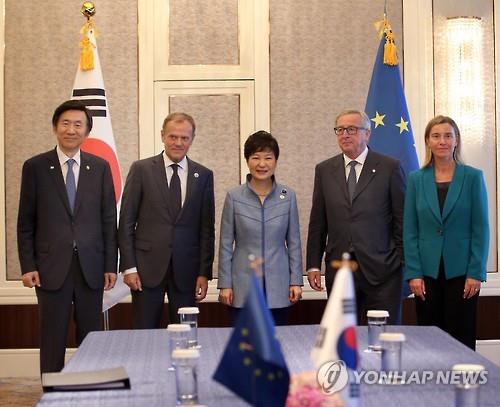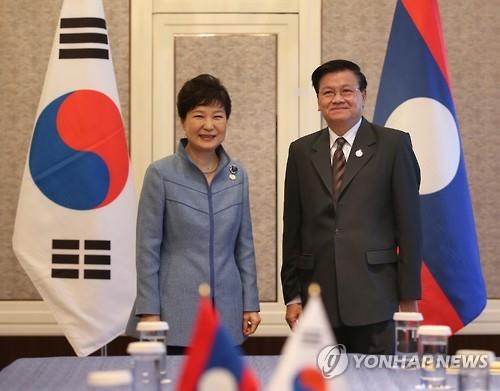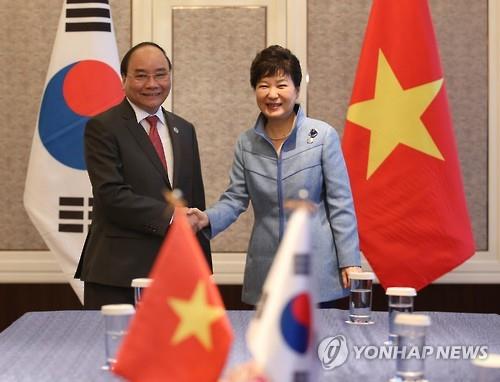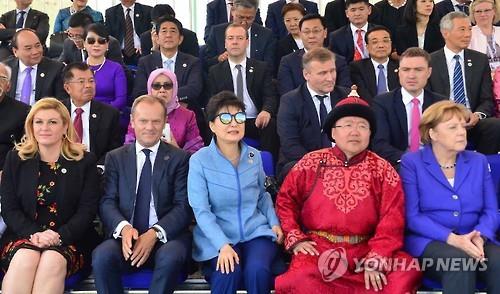- California Assembly OKs highest minimum wage in nation
- S. Korea unveils first graphic cigarette warnings
- US joins with South Korea, Japan in bid to deter North Korea
- LPGA golfer Chun In-gee finally back in action
- S. Korea won’t be top seed in final World Cup qualification round
- US men’s soccer misses 2nd straight Olympics
- US back on track in qualifying with 4-0 win over Guatemala
- High-intensity workout injuries spawn cottage industry
- CDC expands range of Zika mosquitoes into parts of Northeast
- Who knew? ‘The Walking Dead’ is helping families connect
S. Korean, EU leaders share need to revise bilateral FTA
ULAANBAATAR, July 15 (Yonhap) — The leaders of South Korea and the European Union (EU) on Friday “shared the view” that there is a need to revise the bilateral free trade agreement (FTA) in the wake of Britain’s recent decision to leave the 28-member bloc, Seoul’s presidential office Cheong Wa Dae said.
President Park Geun-hye, European Commission President Jean-Claude Juncker and European Council President Donald Tusk held talks on the sidelines of the Asia-Europe Meeting (ASEM) summit in Ulaanbaatar.
During the meeting, they shared the view that the two sides should work together to create a “new turning point” to expand mutual trade through a revision of the bilateral FTA, which was signed in 2010 and provisionally took effect in 2011.
“In consideration of the situational changes” over the last five years since the FTA took effect, the revision process should proceed, the leaders noted, according to a press release from the presidential office.

President Park Geun-hye (C), European Commission President Jean-Claude Juncker (2nd From R) and European Council President Donald Tusk (2nd From L) pose before their talks on the sidelines of the Asia-Europe Meeting (ASEM) summit in Ulaanbaatar, Mongolia, on July 15, 2016.
During the talks, Park stressed the need for the two sides to work closely together, both on the bilateral and multilateral levels, to bolster free trade in the world. She then expressed concerns that Britain’s exit from the EU could trigger “isolationism and protectionism.”
Park also called on EU leaders to strengthen bilateral cooperation in tackling various global challenges so as to promote peace and prosperity, while expressing confidence that the EU would continue to develop into a more solid, integrated institution even after Britain’s departure.
Juncker said that Britain’s exit from the EU would not have any impact on South Korea-EU relations, and that the bloc would continue to strengthen bilateral cooperation in various areas as a “trustworthy” partner.
The South Korean president also used the meeting to underscore that the international community should continue to pressure Pyongyang to abandon its nuclear and missile programs and improve its woeful human rights situation.
She reiterated the need to create a situation in which Pyongyang has no choice but to opt for denuclearization through the faithful enforcement of international and standalone sanctions against the provocative regime.
It was Park’s second summit with the current EU leadership, which came into office in 2014.
Earlier in the day, Park also held a separate one-on-one meeting with Laotian Prime Minister Thongloun Sisoulith.
She discussed ways to enhance practical cooperation with the Southeast Asian nation, which is this year’s rotating chair of the 10-member Association of Southeast Asian Nations (ASEAN).

President Park Geun-hye (L) and Laotian Prime Minister Thongloun Sisoulith pose before their talks on the sidelines of the Asia-Europe Meeting (ASEM) summit in Ulaanbaatar, Mongolia, on July 15, 2016.
Park called for “active” cooperation from Laos in ensuring that the ASEAN as a whole delivers a clear message to Pyongyang against its development of nuclear arms and provocative behavior.
She also appreciated Laos’ support of the vision of a nuclear-free Korean Peninsula and its faithful enforcement of international sanctions on the North.
The president expressed her wish to strengthen high-level personnel exchanges and “strategic communication” between the countries, noting that the two countries have recently deepened defense cooperation through a set of initiatives, including one to install defense attache offices in each other’s countries.
It was the first summit between the two leaders since a new Laotian government took power in April.
Soon after the talks with the Laotian premier, the president held separate talks with Vietnamese Prime Minister Nguyen Xuan Phuc, who also took office in April.

President Park Geun-hye (R) and Vietnamese Prime Minister Nguyen Xuan Phuc pose before their talks on the sidelines of the Asia-Europe Meeting (ASEM) summit in Ulaanbaatar, Mongolia, on July 15, 2016.
The leaders discussed ways to bolster their cooperation in various industrial sectors such as new energy, information and communications technologies (ICT) and health care in addition to the manufacturing sector.
They also exchanged views on how to strengthen their strategic partnership ahead of the 25th anniversary next year of the establishment of their countries’ diplomatic ties.
Sharing the understanding that Pyongyang’s nuclear and missile programs pose a great threat to peace and stability not only on the Korean Peninsula but also in the world, the two sides agreed to work closely together to address the security threats.
On the first day of the ASEM summit, Park also briefly met with top officials from Japan, Russia, Cambodia, Bulgaria, the Czech Republic and Croatia.
During their talks at a gala dinner, Park and Japanese Prime Minister Shinzo Abe agreed to try to reinforce international cooperation to pressure Pyongyang to abandon its nuclear and missile programs.
At the dinner gathering, Park also met with Russian Prime Minister Dmitry Medvedev. Park voiced her wish to further strengthen the two countries’ economic ties, particularly on the occasion of the East Russia Economic Forum slated to take place in Russia in September.
After the first round of the ASEM summit, Park and other leaders watched Mongolia’s annual “Naadam Festival.” The midsummer festival is also dubbed the “three games of men” — horse racing, wrestling and archery.

President Park Geun-hye (3rd from L) and other leaders watch Mongolia’s annual “Naadam Festival” in Ulaanbaatar after the first round of the Asia-Europe Meeting summit on July 15, 2016.
Meanwhile, Park plans to explain Seoul’s position on North Korea’s human rights violations, its security threats and her push to lay the groundwork for reunification during a free debate session at the ASEM summit on Saturday, her office said.











